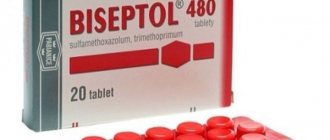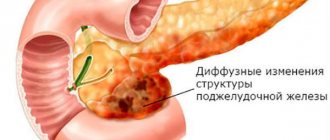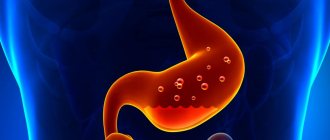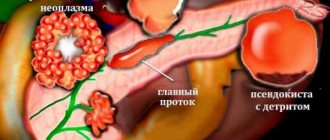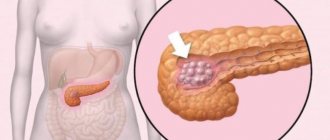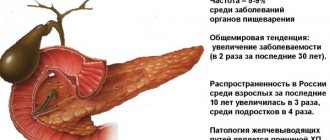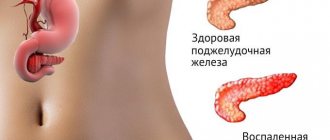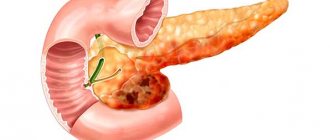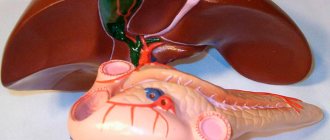For pancreatitis, enzyme preparations are necessarily prescribed. They are designed to relieve acute pain and compensate for the constant lack of their own digestive enzymes. To relieve pain, drugs are prescribed in tablets, and to replace the lack of enzymes, drugs in capsules are prescribed. With a well-chosen enzyme preparation, the symptoms of pancreatitis are relieved and digestion is restored.
Enzyme preparations
To restore normal digestion, it is necessary to verify the diagnosis. For this purpose, functional ultrasound is prescribed - ultrasound of the abdominal organs, in severe cases, if necessary, CT, MRI, and laboratory tests that determine the level of enzymes in the blood and feces. Analysis of the results obtained and objective examination data will show which enzymes to drink in order to increase their levels.
Treatment of pancreatitis, like diabetes mellitus, takes a long time; sometimes you have to take the necessary enzyme and glucose-lowering drug for life.
For pancreatitis, complex therapy is effective: in addition to enzyme preparations for the pancreas, a number of other medications are used to influence all disturbed stages of digestion. A diet is required throughout the entire period of treatment. Sometimes it has to be followed always in order to preserve the pancreas. This approach to treatment helps the affected organ gradually recover and compensate for the lack of plant enzymes supplied with food.
Classification of drugs
After clarifying the diagnosis and functional disorders, medications are prescribed aimed at restoring the functioning of the organ. Depending on how the enzymatic balance of the gland is disturbed, medications are prescribed - enzymes and antienzymes:
- Drugs from the first group are necessary to replace the lack of own enzymes and slow down the formation of connective tissue during chronic pancreatitis. In severe cases, death of parenchyma cells occurs, reaching 90% of the organ volume. It is impossible to completely restore the functions of the affected organ. Each exacerbation reduces them. Enzyme preparations are prescribed for a long time to improve digestion. Sometimes you have to be treated with enzymes all your life, increasing the dose as the activity of the gland fades.
- The second group of drugs is intended to relieve acute inflammation in the pancreas. Due to blockage of the ductal system, which occurs for a number of reasons, enzymes do not enter the lumen of the duodenum, but are activated in the gland itself and begin to digest its tissue. This is accompanied by intense pain up to the development of shock and requires emergency measures in an intensive care unit or surgical department.
- Having pancreatin (Creon, Pangrol, Mezim-forte, Pancreatin).
- Consisting of pancreatin, hemicellulase, bile (Festal, Enzistal, Digestal, Panzinorm).
- Derived from plants (Solizyme, Unienzyme, Somilase).
- Combined (Wobenzym, Flogenzym).
- Simple - Betaine, Abomin.
- bicarbonates,
- microelements,
- water.
Correction of exocrine insufficiency is carried out based on the level of lipase. This is an essential enzyme, produced almost in full only by the pancreas itself.
Therefore, the activity of the drug that is selected for replacement therapy is assessed in lipase units - LE. The name of any drug contains this data - the amount of lipase in LE. The list of enzyme preparations for correcting digestion is extensive.
There is a classification that takes into account the origin of enzymes and their use. She divides drugs into 5 groups depending on the presence of pancreatin in them:
Description
In addition to enzymes, pancreatic juice contains:
Enzymes are destroyed in an acidic environment. Therefore, modern pharmacology is aimed at creating drugs in acid-resistant shells. This protects them from the aggressive influence of hydrochloric acid in the stomach and makes it possible to enter intact into the small intestine, where their activation occurs.
The tablet (conventional name in this case) of some drugs is available in two capsule shells. The outer capsule dissolves in the stomach. Microcapsules come out of it, which are also covered with a protective capsule layer from digestion by hydrochloric acid in the stomach. They mix evenly with the chyme (food bolus), which promotes better digestion in the small intestine, where the second membrane dissolves. Thanks to this configuration, the drug works as efficiently as possible and fully performs the functions of breaking down food components.
The price of such drugs is higher than regular tablet ones, but they also act faster. This is how the only highly effective drug, Creon, is designed; its cost remains high. Other medications available in capsule form have one shell.
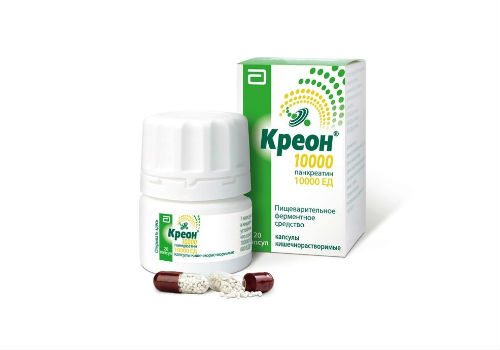
Use for illness
The first group of enzymes according to the classification does not contain bile acids. Indications:
- chronic pancreatitis,
- dysbacteriosis – pathogenic microbes destroy enzymes,
- hyperacid gastritis,
- intestinal pathology with malabsorption and maldigestion syndrome.
Bile acids in drugs of the second group:
- enhance the secretion of enzymes,
- increase motility of the gallbladder and intestines.
Hemicellulase:
- breaks down plant carbohydrates,
- inhibits gas formation in the intestines.
Indications for use: pathology accompanied by belching, flatulence, constipation.
Contraindications:
- pancreatitis (acute and chronic),
- diarrhea,
- peptic ulcer,
- if the liver is affected.
Plant enzyme is indicated:
- for chronic pancreatitis,
- intolerance to meat (enzyme preparations are made from it).
Contraindication for Solizim and Somilase is an allergy to penicillin.
Combined preparations (Wobenzym, Unienzym and others), containing pancreatin, plant enzymes, vitamins, have 75 times less activity compared to enzymes of animal origin. Contraindications:
- bronchial asthma,
- tendency to allergic reactions.

Simple enzymes (Abomin, Betaine) break down only proteins, so they are rarely used. The only indication for use is hypoacid gastritis.
When exposed to them, an increased level of gastrin is observed, which increases the secretion of gastric juice and increases the tone of the digestive organs.
How does a healthy organ work?
The pancreas is a complex gland. There are two parts with different functions: exocrine, endocrine. The exocrine part releases substances to the outside. It makes up the bulk of the gland and forms its parenchyma. In the thickness of the exocrine part, more in the tail, small sections of the endocrine part are interspersed, which are called islets of Langerhans. This area is surrounded by a small network of blood capillaries, so secreted hormones freely enter the blood.
The pancreas, in accordance with its structure, has two main functions: exocrine and intrasecretory. Exocrine function is the production of pancreatic juice, which contains enzymes necessary for the normal digestion of food in the intestine. Nuclease, protease, amylase, steapsin, lipase are produced.
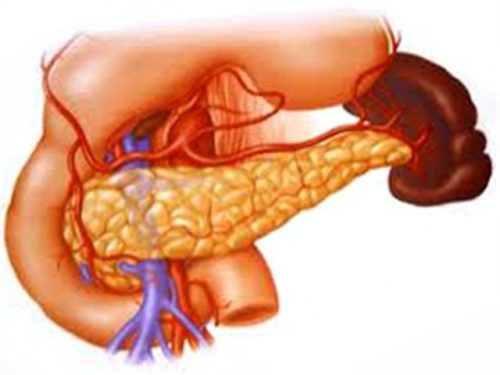
Nucleases break down nucleic acids that come from food. Under their influence, a foreign genetic substance that enters the digestive system breaks down into small parts that are not dangerous to the body. Proteases break down proteins, breaking them down into amino acids. The most important of these enzymes are trypsinogen and chymotrypsinogen. Amylase promotes the digestion of starch and glycogen (carbohydrates), lipase and steapsin are needed for the breakdown of fats.
Pancreatic juice is secreted in parts, its secretion is enhanced by the sight of food, the smell (conditioned reflexes), swallowing and chewing food (unconditioned reflexes), stretching of the stomach by the incoming bolus of food and the humoral factor.
Humoral regulation is carried out with the help of intestinal hormones – secretin and pancreozymin. They are secreted by special cells of the wall of the duodenum when hydrochloric acid and products of the initial breakdown of proteins from the stomach enter it. The secretion of pancreatic juice depends on food intake. Conditioned and unconditioned reflexes act on the production of juice through a center in the medulla oblongata. The secretion of enzymes is also influenced by some hormones of the pituitary gland, adrenal glands, and thyroid gland.
The islets of Langerhans, under the influence of predominantly humoral factors, secrete the following hormones: insulin, glucagon, somatostatin, pancreatic polypeptide.
Insulin is involved in the process of glucose uptake by cells. It converts glucose into glycogen, which accumulates in muscle and liver cells and is used by the body when necessary. Glucagon causes the breakdown of glycogen in the liver and an increase in the amount of glucose in the blood. Insulin and glucogen maintain the balance of carbohydrates in the body.
Somatostatin is a substance that blocks the synthesis of many other hormones and enzymes in the body (thyroid-stimulating hormone, hormones of the pancreas itself, digestive enzymes, bile).
Pancreatic polypeptide activates the secretion of gastric juice. The islets of Langerhans also secrete in small quantities other substances that regulate digestion - c-peptide, ghrelin.
In a healthy person, when food enters the body, the pancreas begins to produce enzymes, which, through a duct connected directly to the beginning of the duodenum, enter the small intestine. Substances promote food processing, intestinal absorption of beneficial substances entering the body, metabolism and other important processes.
As a result of various disorders, the pancreatic duct is blocked, its enzymes, and sometimes pancreatic juice, when food enters the body, remain in it, and the digestion processes occur in the gland itself. In some cases, activation of the production of enzymes by the gland occurs prematurely, which leads to a condition where pancreatic enzymes remain in the body of the organ and begin their action inside it, causing an inflammatory process. Inflammation of the pancreas is called pancreatitis.
In what cases and when are enzymes prescribed?
Enzymes are used:
- for single use,
- for long-term treatment.
In case of food and alcohol load, it can be taken as required.
For continuous therapy, the medicine is selected individually, taking into account lipase activity. The effect is assessed by laboratory parameters (fecal elastase) and the patient’s condition. Taken into account:
- pain relief,
- stool (frequency and nature of bowel movements),
- weight.
No effect observed:
- with inadequate dosage,
- hyperacidity,
- with dysbacteriosis.
In case of severe hyperacidity, medications are used in parallel, the purpose of which is:
- block histamine receptors, providing a pronounced antisecretory effect,
- inhibition of hydrochloric acid in the stomach.
For this we use:
- H2 - histamine receptor blocker (Famotidine),
- PPIs - proton pump inhibitors (Omez),
- antacid
The list of these medications is extensive; a specific drug is prescribed by a doctor. He will also explain how to take it correctly and how much to use over a certain period. When choosing, its mechanism of action is taken into account.
Capsules
With prolonged pancreatitis, exocrine insufficiency develops as a result of the fact that the gland stops producing enzymes involved in digestion. This leads to impaired absorption of nutrients, weight loss sharply, feces become greasy, diarrhea occurs, and other signs of maldigestion are revealed.
In case of chronic pancreatitis, replacing your hormones with medications is simply necessary. To prevent the medication from being digested in the stomach, pancreatin capsules are prescribed. Taking the medicine in this form allows the drug to mix well with food and move along with the food bolus through the stomach, and then through the intestines, exerting its intended effect.
Capsules are digested only in the alkaline environment of the duodenum. Inside they contain many mini-tablets, mini-microspheres or mini-pellets of pancreatin, which makes it easier to mix with the food bolus. Each particle has a size of at least 2 mm.
The specificity of this form of drugs is that when enzymes do not have time to activate in the duodenum, the secretion of their own enzymes is not suppressed. To maintain long-term therapy for chronic pancreatitis, Creon, Micrazim, Pangrol, Panzinorm 1000, Ermital are used.
Enzyme preparations for chronic disease
For chronic pancreatitis, the basis of treatment is enzyme replacement therapy. The first type of drugs with pancreatin is used. The medicine should not contain bile, which causes an increase in enzymatic secretion and increases pain.
Shown: Creon, Mezim-Forte, Pancreatin.
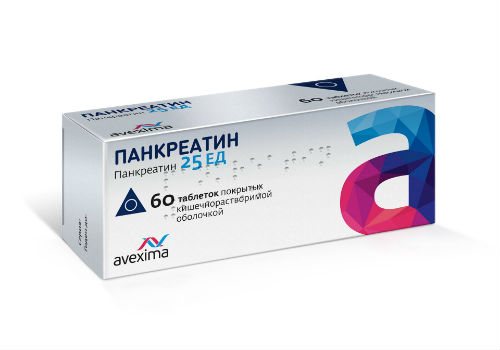
Contraindicated: Festal, Digestal, Panzinorm.
Cause of problems
The pancreas produces special enzymes in the body, without which the process of digesting food is impossible. When the normal functioning of the pancreas is disrupted and the amount of components produced decreases, pancreatic enzyme insufficiency develops. The causes of primary pancreatic insufficiency include all types of chronic pancreatitis.
The reasons for the development of a condition in an organ can also be:
- Damage to tissues that make up the organ;
- Vitamin deficiency in the body;
- Decreased protein concentration in the blood;
- Decreased hemoglobin in red blood cells;
- Violation of the diet, leading to disruptions in the body.
A lack of enzymes can occur as a result of replacement of pancreatic tissues with connective tissue, atrophy of the pancreatic ducts, their swelling, damage to pancreatic tissue as a result of the inflammatory process inside the gland.
Enzyme deficiency is identified by specific symptoms. The patient complains of constant bloating, nausea when eating certain foods, diarrhea, lack of appetite, and a constant feeling of unreasonable fatigue.
Treatment includes therapy for the underlying disease, normalization of the supply of nutrients to the body, replacement of pancreatic enzymes, and symptomatic treatment.
Enzymes for pancreatitis: how many days?
Treatment with enzyme preparations is prescribed on an individual basis. If a patient has severe enzyme deficiency, the doctor may recommend that he take such medications on a regular basis.
To improve the digestive process, when digestive disorders are caused not by a functional malfunction of the pancreas, but by overeating, the use of alcoholic beverages, or food poisoning, enzyme preparations are prescribed for a short period of time.
Using enzyme preparations on your own, without consulting a doctor, can negatively affect your health, because if the body has enough enzymes to ensure digestion, such products can reduce their own production.
